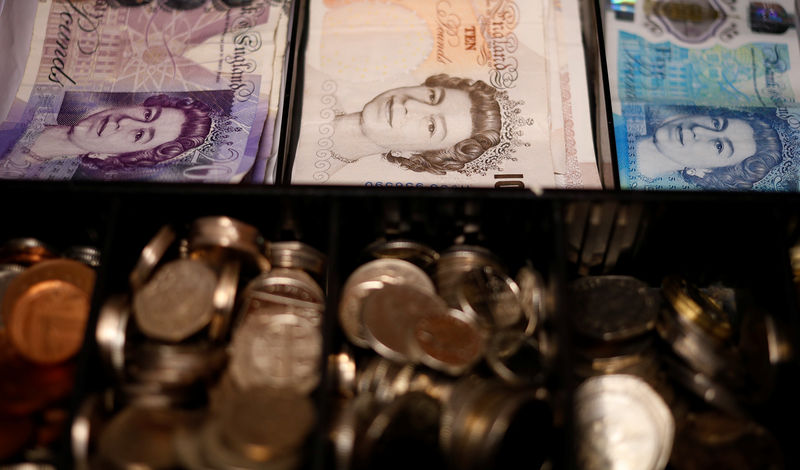 © Reuters. FILE PHOTO: Pound notes and coins are seen inside a cash register in a bar in Manchester, Britain
© Reuters. FILE PHOTO: Pound notes and coins are seen inside a cash register in a bar in Manchester, BritainBy Jamie McGeever
LONDON (Reuters) – Hedge funds are betting big against sterling, the most since May last year. And following last week’s Brexit debacle in Salzburg, that bet will probably be even bigger now, closing in on the largest on record.
Funds and speculators have been growing increasingly bearish on the pound since April, when it traded above $1.42. Their aggressive selling helped to drive it below $1.27 last month.
They have increased their net short position in sterling in the latest week to 79,258 contracts, according to the latest Commodity Futures Trading Commission figures from U.S. futures exchanges. That’s a $6.51 billion bet against the pound.
But those figures are for the week ending Sept. 18. That was Tuesday, before the European Union summit in Salzburg on Thursday, which laid bare the chasm between Britain and the EU on Brexit.
Talks between the EU and Prime Minister Theresa May on how to manage Britain’s withdrawal from the bloc, which is only six months away, hit a brick wall. The consensus seemed to be that it was a humiliation for May.
She hit back the following day with a defiant speech that cheered the Tory party faithful and eurosceptic elements of the UK media. But as far as the FX market was concerned, it only raised the likelihood of a no-deal Brexit.
Sterling duly tumbled, falling more than two cents against the dollar, or 1.7 percent, marking its biggest one-day fall in nearly two years. There’s every chance hedge funds already betting on the pound falling will have doubled down.
Their net short position of 79,258 contracts is already among the largest since CFTC began compiling data in 1995. The only time it has ever been bigger was the year after the Brexit referendum itself, between July 2016 and May 2017.
(For graphic on hedge funds attack sterling, click https://reut.rs/2xyWvIB)
(For graphic on sterling/dollar and Salzburg, click https://reut.rs/2xzR6kg)
“MATERIAL NEGATIVE”
The speculative community’s turn against sterling since April has been sharp. Then, they were net long to the tune of 47,702 contracts, a bet worth $4.26 billion. Their $6.51 billion short position now marks a swing of $10.77 billion in five months.
And that may only be the tip of the iceberg. Analysts at one large bank estimate that the CFTC positions are only around 20 to 30 percent of all short positions in the pound across the global currency market.
Bank of New York Mellon’s Simon Derrick said on Monday that the bank’s internal flow data show investors “continuing to shun sterling”. Analysts at JP Morgan are also recommending that clients stay short.
In a note on Friday, Deutsche Bank’s Oliver Harvey said May’s speech was a “material negative” for sterling. A Brexit deal remains his base case scenario, but he recommends selling the pound against the euro “to hedge against an increasing deterioration of Brexit negotiations”.
Sterling’s fortunes against the dollar and hedge funds’ positions have been pretty closely correlated since the Brexit referendum in June 2016. That’s likely to remain the case in the months ahead, and the primary drivers of both are likely to remain Brexit and UK political developments.
Harvey notes that positioning in sterling remains short but well below extremes. It could get worse for the pound before it gets better. “A negative turn in the politics still leaves plenty of downside, in our view,” he said.
Source: Investing.com



























